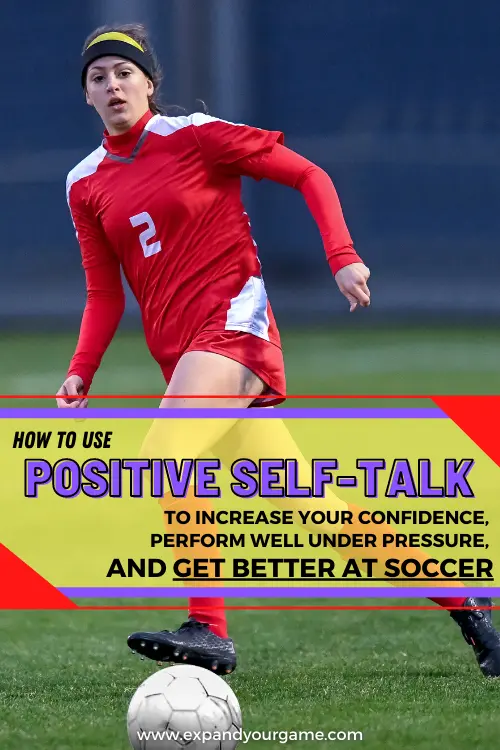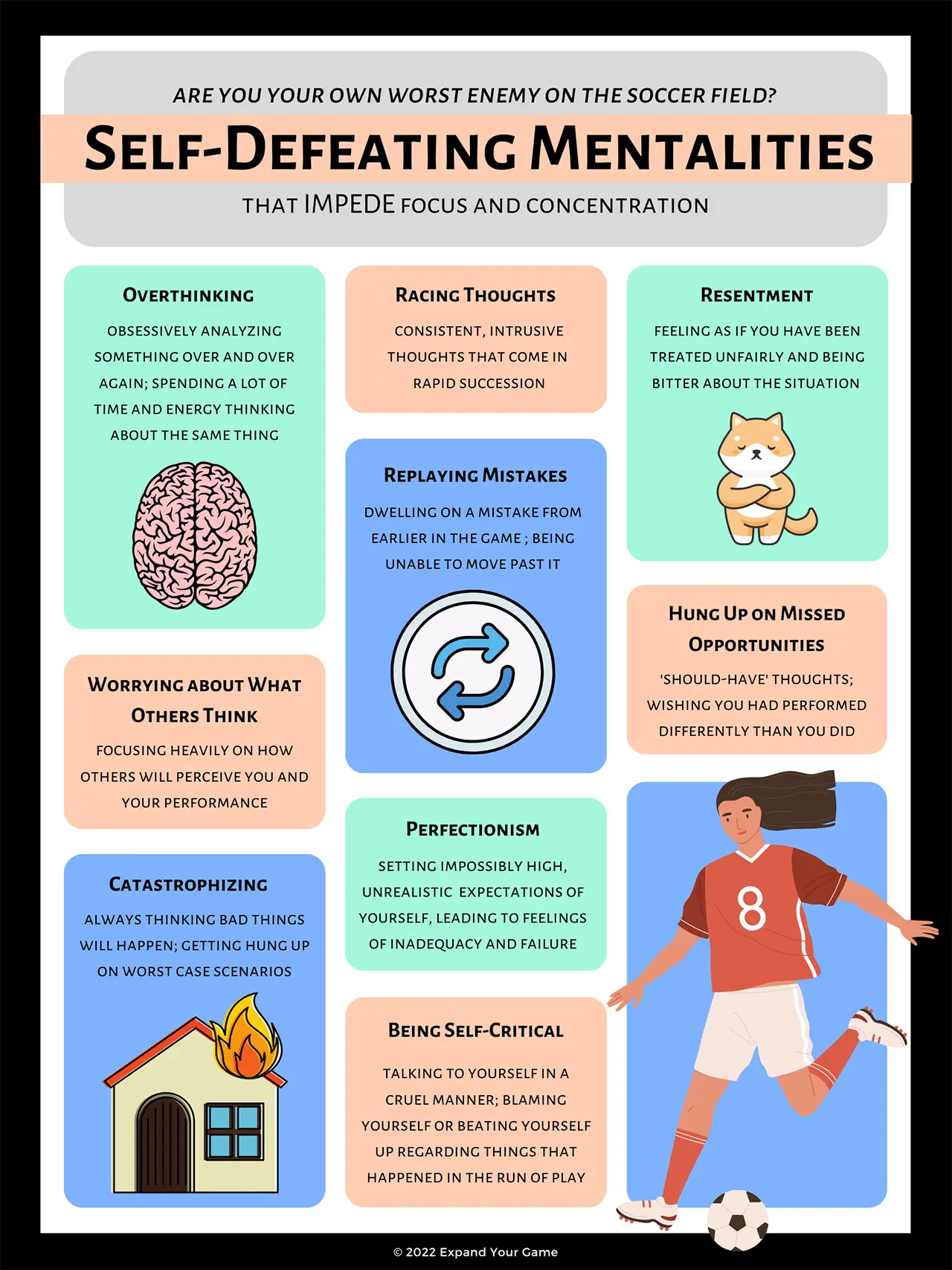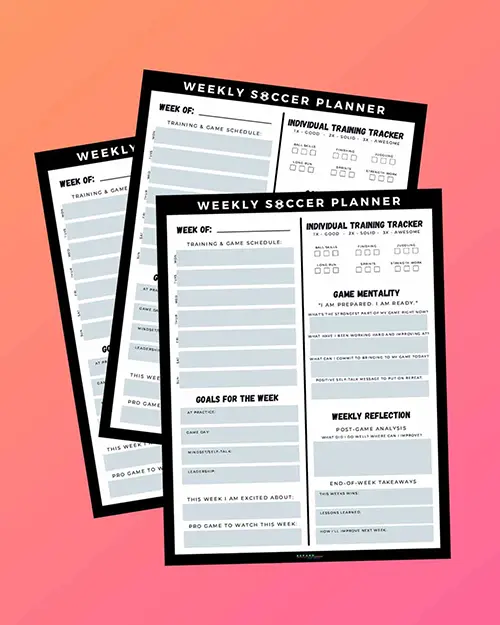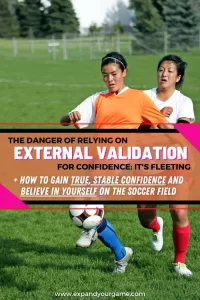
Having positive self-talk doesn’t mean being chipper and cheerful all the time. Having positive self-talk simply means making sure you have only GOOD, USEFUL and CONSTRUCTIVE messages running through your head on the soccer field. And that you are intentionally choosing to say NO to the detrimental thoughts that get in the way of your ability to focus and concentrate on the soccer game in front of you.
A habit of positive self-talk is something that can give you a HUGE edge on your competition. Positive self-talk can help you take your soccer game to the next level (and pretty quickly too if you commit and get invested). Let’s dive in and talk about how developing a habit of positive self-talk (specifically motivational and instructional self-talk) can help you increase your confidence, perform under pressure and ultimately, get better at soccer.
This Post Contains:
Are you your own worst enemy on the soccer field?

Thoughts that negatively impact your game
These self-defeating thoughts all impede focus and concentration and contribute to players getting in THEIR OWN WAY on the soccer field.
- racing, anxious thoughts
- overthinking (about anything and everything)
- worrying about what others think, if their performance is good enough
- catastrophizing (thinking about the worst case scenario)
- negative self talk (aka beating themselves up)
- replaying mistakes, getting stuck in past moments and regretting decisions
- resenting or being angry at teammates, refs, coaches, or anything you can’t control
- ‘I should have done better’ thoughts about missed opportunities
- putting unrealistic expectations on yourself in regards to game outcomes

replaying mistakes on the soccer field
While all of these unhelpful thoughts contribute to players self-sabotaging their own game, one of the most detrimental is getting hung up on mistakes. These repetitive, negative thoughts steal your focus and set you up for MORE errors because you’re not fully concentrated on the game. You’re not fully present, you’re living in the past replaying and reliving the mistake.
This quote from one of my favorites, NBA mental performance skills coach, George Mumford, sums up well the predicament that dwelling on mistakes can put you in: “If you missed a play, it’s over. You can’t dwell on your frustration unless you want to carry that frustration with you into the next play and trip yourself up with that impediment.”
Self-awareness is the first step
It is possible to end these self-defeating, overcritical thought patterns. It just requires practice, patience and a whole lot of self-awareness. To stop the racing thoughts, the overthinking, etc. you first need to be aware of what is happening and what is going on inside of your head. You have to be aware of the damage being done to your game and acknowledge that it is an issue
soccer Is 90% Mental
So what are you doing to train that part of your game?
Introducing the Mindset Mastery Academy
A 10-week 1:1 mental skills mentorship experience for female soccer players
How your thoughts impact your confidence and composure
First off, let’s get clear on the definition of confidence and composure as they apply to the game of soccer:

Negative thoughts destroy confidence and composure by making it very busy inside your head. The self-defeating thoughts make it impossible to concentrate on the things you need to concentrate on in order to play well (such as where the ball is, what am I doing to support my teammates and create space, am I in the right position to defend, etc.).
Detrimental thoughts fill you with doubt, take away your focus, destroy your belief in yourself and make it more likely that you’ll make panicky, rushed decisions. The opposite of calm and composed. And this doesn’t help your confidence either.
Grow your confidence through preparedness.

Subscribe to our email list to
Get your FREE Weekly Soccer Planner!
We respect your privacy. Unsubscribe anytime.
What 'being positive' on the soccer field means
What ‘being positive’ on the soccer field means is having good and useful thinking. It means your self-talk is helpful and encouraging. It means you are focusing on constructively thinking about the situation at hand and doing what you can to make a difference and help your team.

two types of positive self-talk
{Instructional self-talk} is when you give yourself a short instruction about what you should be doing right now in the game. Instructional self-talk is used as a trigger to get you to do something specific. Instructional self-talk is things you can DO, actions you can TAKE.
Instructional self-talk helps you stay calm and keep your mind focused on actions that are within your control. To use instructional self-talk on the field, come up with short, specific phrases or questions that give you direction and are easy to remember. Then put them on repeat in your head. Here’s a few examples: check your shoulders, where’s the space, pick your head up.
Instructional self-talk has the added bonus of keeping you from overthinking, because when you are thinking about your instructional self-talk it puts everything else out of your mind. And your body follows the dominate thought in your head, so instead of overthinking & not being focused, you’ll be taking ACTION in the game. Sounds great right?
{Motivational self-talk} is slightly different and probably more traditionally what you would think of as positive self-talk. Motivational self-talk is encouraging reminders that help motivate you and boost your confidence and belief in yourself. Examples include: “you’ve got this!” and “you are prepared for this, you’ve worked hard and know what to do!”
Motivational self-talk is best used before games or when you have a second to reset on the field, while instructional self-talk is the more helpful in the moment during the run of play.
How to start using positive-self talk at games
Once you have that awareness (which can take a little bit of time), you can move forward and start rewiring your habits. When you notice detrimental thoughts start creeping in, you’ll want to forcefully use positive self-talk to refocus your attention. Start scanning the field, looking for information and giving yourself directions about where you can go and what you can do (aka instructional self-talk). At the same time keep reminding yourself that you’re prepared and ready (aka motivational self-talk).

Your brain is trained to behave in the way it is behaving (the negative, self-defeating mentalities) so and it’s going to take some dedication, hard-work and deliberate planning for you to create new habits and change the patterns. But it is so worth it. Remember:
Remember, you are in charge of what you choose to focus on and what you choose to tell yourself. It is your choice. Positive self-talk is YOUR CHOICE.
Starting a habit of positive self-talk
"Being specific about what you want and how you will achieve it helps you say no to things that derail your progress, distract your attention, and pull you off course."
James Clear, Atomic Habits
So what’s the plan? Pro-actively cultivate positive self-talk BEFORE, DURING and AFTER the game. Let’s dive in.
BEFORE: Start with a winning pre-game mindset
Prepping for a game by telling yourself to not make mistakes will definitely have an effect on your game – but not the kind you were hoping for. If your usual pre-game mindset is sprinkled with anxiety, overthinking, negative self-talk and worse case scenario situations, then your entire game is going to be filled with them as well. It’s a self-fulfilling prophecy.

- What am I good at? (Ex: overlapping runs up the flank!)
- What have I been working hard to improve lately? (my left-footed shot!)
- How am I going to help my teammates play well today? (move into supportive positions early and give good angles to the ball carrier!)
- What can I commit to bringing to my game today, regardless of outcome? (playing with intensity, running hard, and providing good information to my teammates!)
DURING: Maintaining good and useful thinking throughout the match
Even if you started the game confident and composed, you might find that original mentality slipping after something happens and triggers negative, unhelpful thoughts. This is where your planning and intentionally cultivated game mentality comes in.
When you notice your attitude shifting and detrimental thoughts start taking over, MAKE A CONSCIENCE CHOICE TO END THEM. In the words of soccer psychologist Dan Abrahams, “your soccer attitude is a choice,” your thoughts are your choice. YOU must CHOOSE to make the negative thoughts temporary. You must choose to replace them with positive self-talk.

Instructional self-talk to help refocus attention
- Pick your head up, make eye contact, anticipate
- How can we get in behind?
- Find space, run into space, lose my mark
- Who has the ball? Can I better position myself to receive it from them?
- Where is the danger? Where is the opportunity?
Another thing that helps here is to come into the game with instructional self-talk that is specifically focused on your position and your responsibilities. For example, if you are playing a center midfield position, on the attack you might say to yourself “take space, first look forward, break lines, check the flanks.”
Sport mantras as motivational self-talk
- “I am ready, I have trained hard, I feel great.” (to boost confidence and composure)
- “So what, what’s next?” (to recover after mistakes and refocus)
- “Inhale your courage, exhale your fear” (to calm yourself and release anxiety)
- “As the game gets longer, I get stronger” (to give yourself an energy boost as fatigue sets in)
- “Fast is better than slow” (to remind yourself to make early decisions and keep a high tempo)
AFTER: Post-game reflection and self-talk
{Related read: 7 game-changing tips for dealing with PERFECTIONISM in soccer}

Poised, confident and unstoppable
This positive perspective also helps to further quiet the self-defeating thoughts and keep emotions in check, which allows you to play with a calmer mindset and be more composed under pressure. It all comes full circle

Every day that you work to develop good, useful & constructive thinking and positive self-talk, you are doing something phenomenal for yourself as a soccer player AND as a human. Constant improvement is part of the journey, and struggle is a necessary component to forward progression. Internalizing this is a central piece of the elite athlete’s journey.

Hi everyone! I’m Jenn and I create content to help female soccer players and coaches maximize individual and team potential by developing healthy mindset skills. Join other subscribers and sign up for the newsletter for all my best tips and advice!
We respect your privacy. Unsubscribe anytime.









This opened my eyes to the mental side of the game that I didn’t understand. I also neglect my mentality in soccer and now understand how the negative-self talk can impact performance. I will try to improve my mental toughness skills from now on.
Hi Haroun, I am glad this article was able to shine a light on a new perspective and way of looking at things! Yes, the power of intentional self-talk, and other mental skills work, really is boundless both in regards to enhancing performance AND helping with balance and overall mental wellbeing.